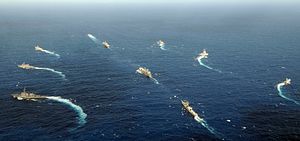This week, India, Japan and Australia held their first ever high-level trilateral dialogue in New Delhi. The talks were attended by Indian foreign secretary S Jaishankar, Japanese vice foreign minister Akitaka Saiki and Australian secretary of the Department of Foreign Affairs and Trade Peter Varghese.
The trio reportedly discussed a range of issues at the dialogue. Maritime security was on the agenda, including freedom of navigation in the South China Sea and trilateral maritime cooperation in the Indian Ocean and the Pacific Ocean. The countries also discussed the prospects for greater economic cooperation.
Indian naval sources also said that a joint exercise between the three nations is a possibility further down the line and that preliminary talks have already taken place. Indian naval officials are currently in Perth for separate talks on their first ever bilateral maritime exercises with Australia scheduled for September off the east coast of India. Separately, New Delhi is also considering including Japan for this year’s iteration of the Malabar Exercises in October, which has usually been an U.S.-India bilateral engagement. This is in addition to the Japan India Maritime Exercise (JIMEX) held annually between the two countries. Tokyo participated in the Malabar exercises last year as well.
The three countries also agreed to hold their next round of talks in Tokyo.
One of the concerns surrounding the trilateral dialogue was the reaction from China. In 2007, India’s involvement in the informal ‘quadrilateral security dialogue’ with Japan, Australia and the United States – with all four participating in that year’s iteration of the Malabar exercises – provoked a strong backlash from Beijing due to fears of encirclement.
But Varghese, the Australian representative at the dialogue, told The Hindu that the trilateral meeting should not be considered an ‘anti-China front.’
“This is not a meeting directed at anyone. We are three countries with a lot to do bilaterally, and we see benefit in cooperation,” Varghese said.
Varghese reportedly had several other meetings scheduled following the dialogue, including one with National Security Adviser Ajit Doval and others with the Commerce Ministry and the Department of Industrial Policy and Promotion. India and Australia had previously committed to strengthening their bilateral economic relationship, including concluding a free trade agreement by the end of 2016.
Yet Varghese told The Hindu that in spite of some changes in the business environment and the willingness of the Modi government to move on reforms, major obstacles remained to investment including various regulatory hurdles, clearances and delays. Separately, some have questioned whether Australia’s attempt to conclude an FTA with India by the end of next year might be too ambitious.
For a more detailed assessment of India-Japan-Australia trilateral cooperation, including its future prospects, see my analysis piece here.































